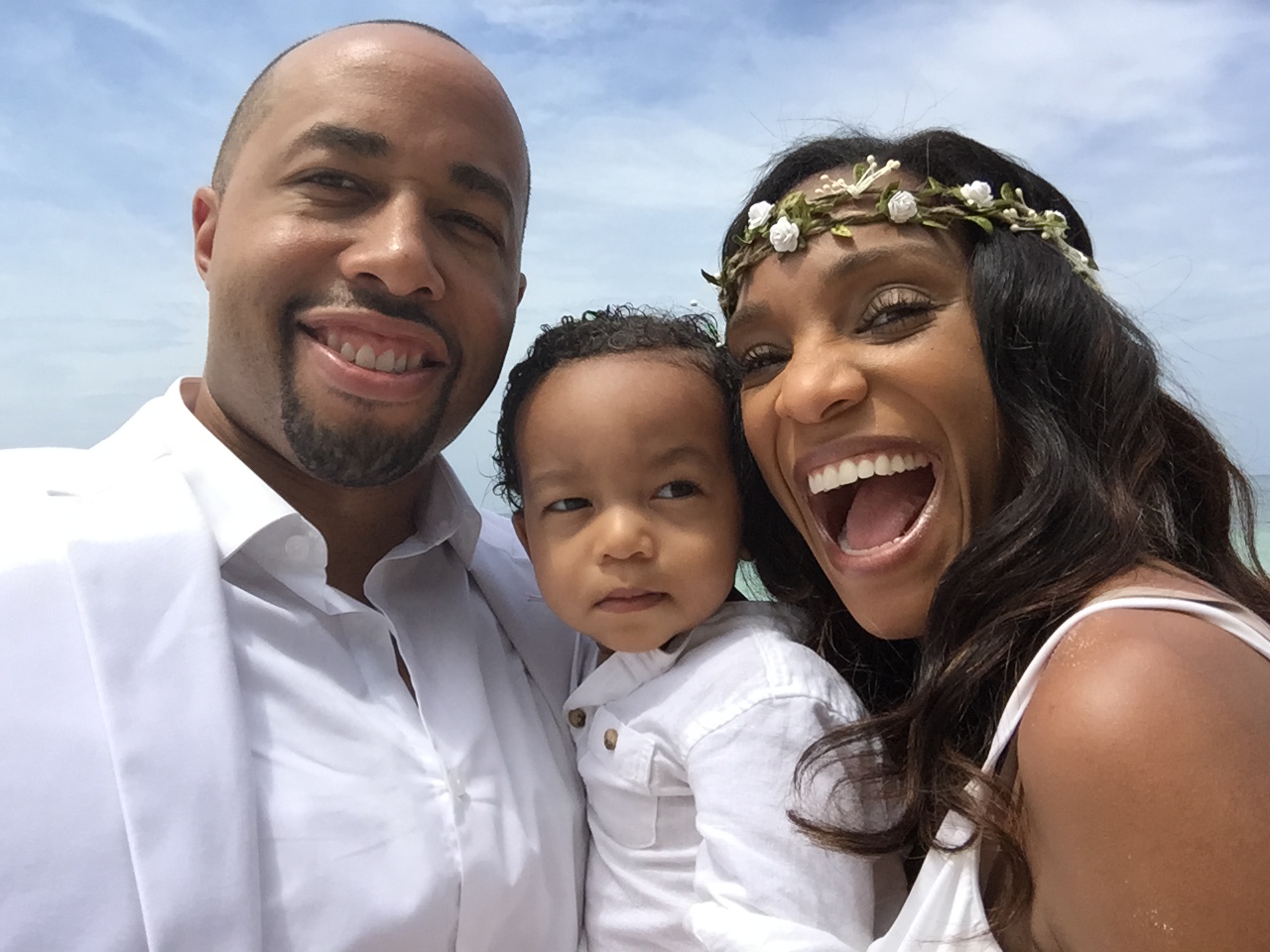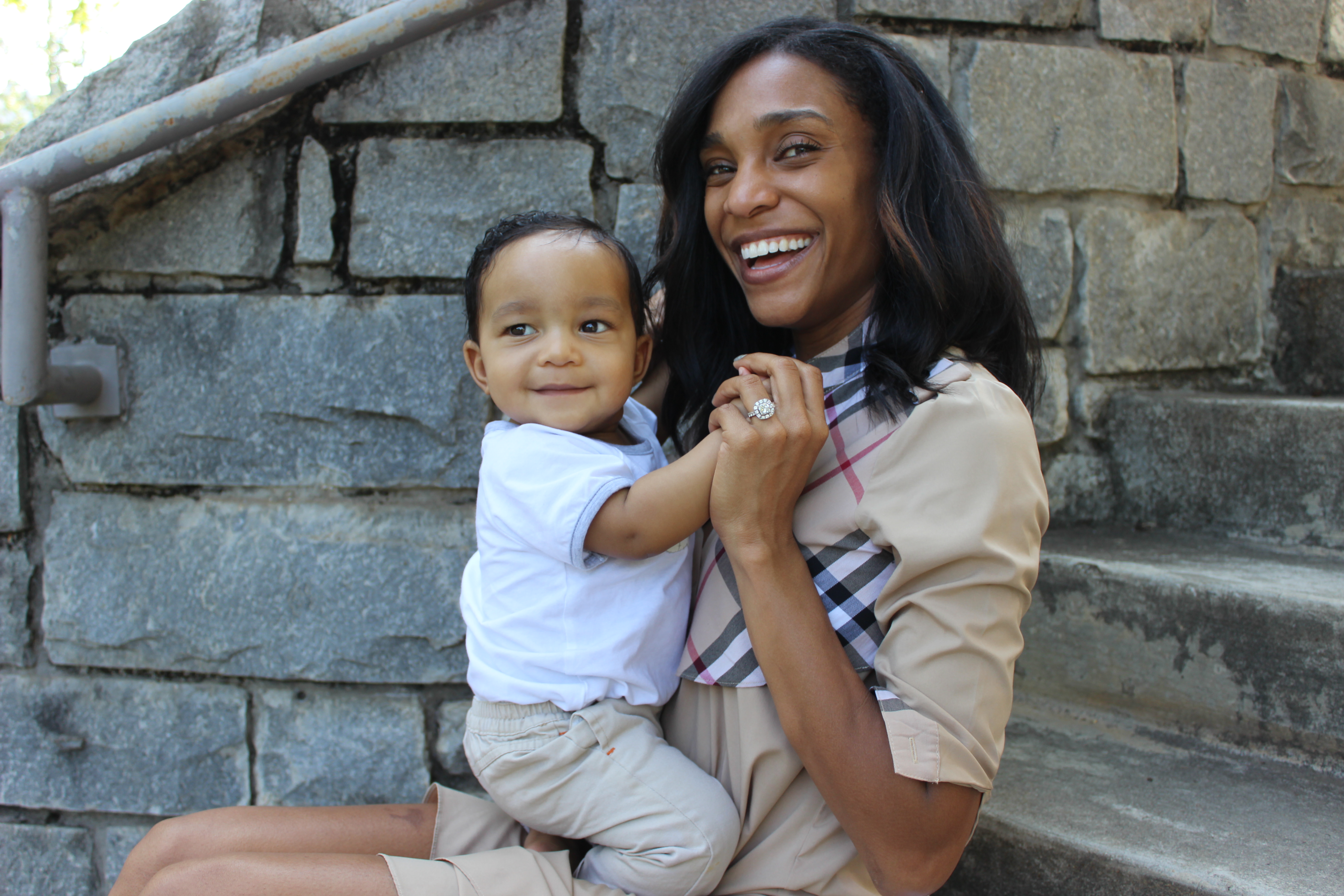
Source: Charles Johnson / Kira Johnson
In 2016, Charles Johnson IV lived every expectant father’s worst nightmare when his wife, Kira, underwent a routine c-section. Kira, who was healthy overall and had a smooth pregnancy, gave birth to the couple’s second child — a healthy baby boy. The mother of two, however, would never make it out of the hospital alive.
Shortly after the procedure, Johnson noticed there was blood in his wife’s catheter. He brought it to the doctor’s attention and was told that she would get a CT scan. Kira continued to fade hours later as Johnson tirelessly begged for help, only to be told that his wife wasn’t a priority. It took 10 hours for hospital staff to take any meaningful action and by then it was too late. Kira’s bladder was lacerated during the c-section procedure,. causing her to hemorrhage and, ultimately, die.
Three years later, Johnson is raising his three- and four-year-old sons without their mother, but he’s turning their devastating loss into triumph with 4Kira4Moms. Johnson —with help from his mother, Judge Hatchett, and a community of people invested in maternal health rights—is working toward changing laws and procedures to make sure this type of negligence doesn’t happen again.
Johnson’s story (and others) is the inspiration for an upcoming episode of Fox’s medical drama, The Resident. On April 15th, the series will tackle the maternal mortality crisis, followed by a town hall addressing maternal health. MadameNoire caught up with Johnson to discuss his experience, the Preventing Maternal Death Act, and more.
MadameNoire (MN): What happened to your wife was terrible. I’ve seen reports that she died from hemorrhaging, but ultimately that was caused by negligence, right?
Charles Johnson IV (CJ): I’ve learned so much about this over the past almost three years doing this work, and what I’ve learned is in a situation where a woman is having a cesarean section, and she is healthy and the baby is not in distress, the cut time from when they make their first should be between 12 or 15 minutes, give or take 3-5 minutes, depending on the situation.
In a situation like Kira’s, where she’s had a previous cesarean, you should add an additional 3-5 minutes to cut through the scar tissue, all in that same procedure. We’re talking 15-20 minutes in that ballpark. Would you like to take a guess on what the cut time was on my son?
MN: 10 minutes?
CJ: Less than two minutes.
MN: Wow, that’s crazy!
CJ: In the process, [the doctor] lacerated [Kira’s] bladder. That’s where she was bleeding from [Writer’s note: There were 3.5 liters of blood found in Kira’s abdomen just before she died]. There’s so many layers of this. The way this has been described by medical experts [when] they reviewed the records, is that what happened to Kira was not a medical tragedy, it was a medical catastrophe. The reality of the situation is that in a hospital like Cedars-Sinai, with a woman that’s healthy, postpartum hemorrhage is not uncommon. Things happen. It wasn’t necessarily that. It was the continued neglect. It was everything, it was the failure to utilize hemorrhage protocols that they have in the state of California.

Source: Charles Johnson / Kira Johnson
MN: How are you coping with your wife’s death today, especially while raising small children?
CJ: It’s different. For me, honest to God, they really are the blessing. I’m so grateful. They’re just the coolest little dudes. They really have all the best parts of their mom. It’s hard. You hear these statistics and they’re so horrifying. Like I say all the time, there’s no statistic that can quantify what it’s like trying to tell an 18-month-old that his mommy’s never coming home. You can’t try and get your head around trying to explain to a son that would never know his mom, just how amazing she was. When we talk about Kira, we’re talking about a woman who raced cars, who ran marathons, who had her pilot’s license, who spoke five languages fluently. To be honest with you, it’s tough. I think for us as a family it’s the hardest thing I’ve ever been through. For me, every day I have to deal with the fact that there’s nothing I can do to bring Kira back. I really do believe that the highest honor that I pay Kira is to do everything I can to make sure we send other mothers home with their babies.
That’s what we’re doing. That’s why I’m so grateful to everybody here at Fox who’s been phenomenal to work with on taking an issue like this and using this platform to put it directly boldly in the face of 10 million Americans. It really is an honor to work with them and to make this all come to fruition.

Source: Charles Johnson / Kira Johnson
MN: What steps did you take following this catastrophe as far as filing a complaint against the hospital? I’m asking you this because I think sometimes people feel like they just feel powerless when you’re dealing with a system as extensive as the medical industry.
CJ: That’s an excellent point. That’s one of the things, too, that I hope to not only empower but also help people understand what they’re entitled to, and empower them from a patient advocacy standpoint, too. We did a couple of things. I think people who are concerned, who have had situations, whether it’s just in childbirth or just medical, they feel like they may be a victim of medical malpractice, two things are critical. If the situation or circumstances present themselves, file legal action, which we did. There is a lawsuit against Cedars-Sinai hospital and the doctors that are involved in this. Also, file a complaint, make sure that you file a complaint with the local medical board against the doctors.
I have this acronym that I use, which is just ACT. We’ve got to have accountability, compassion, and transparency. Those are the big things that I feel are missing in medicine today. We’re working hard to make sure there’s a priority and a focus on them.
MN: Tell me about the Preventing Maternal Deaths Act.
CJ: The Preventing Maternal Deaths Act is the first-ever federal legislation to help put an end to this maternal mortality crisis. What it will do is give the CDC funding to create what are called maternal mortality review committees in all 50 states.
What those maternal mortality review committees will do is any time a woman anywhere in the country dies as a result of childbirth, they will go in and investigate the situation and collect all the data, very importantly, in a standardized way. The reality of the situation is this is a very, very complex problem, and in order to fix it, we really have to understand all the root causes. People think to standardize the data, but what does that mean, and how does that have an impact?
I’ll give you an example. We talk about Kira’s case. It’s very clear that this is a cut and dry case of a woman that died from preventable causes related to childbirth. However, when you look at this from a data collection standpoint and a standardization standpoint, when you look at Kira’s birth certificate, it simply says that she died from hemorrhage/shock. It says nothing on her birth certificate about her even being pregnant.
I’ll just be honest with you too. We know that the United States leads the civilized world in women dying in childbirth. We know that African-American women are dying four times as much as their Caucasian counterparts. One of the things that I’m –just my personal opinion in my field, this is not backed up by any scientific data — but I’m concerned that once we start collecting real data in a standardized way, that the statistics may even be more severe. I think there are women that are still slipping through the cracks because of the way that there just hasn’t been a focus.
A lot of women are suffering in silence or they’re having complications that are catching up with them a couple of months down the road that are stemming from their pregnancy, but they’re not even being viewed as maternal mortality statistics. Once we’re really taking a look at this, I think we’re going to have some data. I’m hopeful that, even though it’s scary, I am hopeful that this is going to be an important first step in turning this all around.

Source: Charles Johnson / Kira Johnson
MN: I’m so appreciative of people like you who come to work like this because I’ve heard so many stories from friends who had frustrating experiences while giving birth and even in the postpartum period where complaints were overlooked that turned out to be serious situations. One of my friends had postpartum high blood pressure that got glossed over but she checked into the hospital anyway because she passed out and it turned out she was near stroke levels.
CJ: I appreciate you saying that. That was one of the things, it’s just so unfortunate because that’s the thing that I hear consistently. I’ve forged relationships with so may families and so many women and they are both families of women that have died in childbirth and women and families that have had near misses. It is the same thing over and over again.
Although it’s disproportionately affecting African-American women, women from all backgrounds are saying the same thing. They’re being dismissed as hysterical. They’re being disregarded, and their symptoms are being dismissed. It’s the same thing in these dismissals and this gross categorization of women being hysterical or not being in touch with their bodies is having fatal, fatal consequences. We see this, whether it’s Kira, whether it’s Lashonda Hazard, whether it’s Serena Williams, these women are being dispensed with, being ignored. We got to do something about it. We’ve got to apply pressure until we really see some significant changed.

Source: Charles Johnson / Kira Johnson
MN: How has your mom been guiding you through this work?
CJ: I’m just so fortunate, not only my mom, but I just have a tremendous, tremendous team of family and extended family. It’s great to have my mom as an advisor and the real is, at the end of the day, I’m so proud of my mom and all things she’s accomplished, but the thing that anybody who knows my mom will tell you is she’s a mom first. She’s really as real as it gets.
This, for her, has been extremely difficult, because her and Kira were extremely close. Kira really was a daughter that my mother never had. This has been very, very difficult and very painful for her outside of what it’s meant for her son and her grandsons. Just like us, she’s angry, she’s hurt, but it’s good to have her along with the rest of our family in our corner.

Source: Charles Johnson / Kira Johnson
MN: What advice do you have for fathers who are with their partners in labor and may recognize signs that something is going wrong? How should they communicate?
CJ: I think first and foremost what I advise everybody to do is be very informed about understanding your patient bill of rights. Every hospital, every healthcare provider has a patient’s bill of rights. That will tell you exactly that you are indeed entitled to a second opinion and under what circumstances they are.
Be relentless about your concerns. Try your best to stay cool, try your best to stay level-headed, but if you see something and you’re concerned about something, make sure you escalate it. Do your best to have a resource outside of the team that’s responsible at the hospital that you can call.
If there’s somebody at your significant other or wife’s office that you can reach out to, have that number programmed into your phone so if the doctors and the staff are telling you one thing at the hospital and you’re not comfortable with it, have a resource that you can reach out to. One of the things we’re working on, too, is making sure at our foundation that we can help. People have access to those things when those times are critical, but yeah, just be involved. Be aware. Advocate relentlessly, if you can.
The other thing is ask questions. I know that logistics don’t always permit, but if you can make those check-up visits, go. Ask questions so that you’re all on the same page. If you don’t make the visit, interview your wife or significant other when she gets home about exactly what the doctor said. Be clear who those doctors are. When you get to the hospital, understand what the chain of command is. If there’s a nurse, know who the supervising nurse is. If you’re concerned, don’t be afraid to escalate the situation by any means necessary.

Source: Charles Johnson / Kira Johnson
MN: What advice do you have, unfortunately, for fathers who may have lost their child’s mother?
CJ: I know that situations are different, but unfortunately, I’ve met and I’ve become friends in some instances with way too many dads that are going through this. In the event that you’re blessed to have your children—I have some fathers that the mother and the baby didn’t make it—do your best to channel those feelings, that anger, that hurt, that pain, into them and making sure that they are the most absolutely phenomenal representation of their mother that they can be. We have a saying in our house it really is our motto—we wake up every day and make mommy proud, and repeat.
That’s how, because it’s a lot. It’s overwhelming, those feelings. It is the craziest mix of pain, anger, frustration, and sometimes, I’ll be honest, even in my case, guilt. Just wondering what I should have done, what I could have done differently, what I could have done more of, and really feeling like I let my wife down in the worst way possible. As a father, as a husband, it’s your job fundamentally to protect your family.
Just do everything you can to do that. I would advise making sure that you’re taking care of yourself. Making sure that you are seeking whatever help you need in the form of grief counseling, if and when you are ready. For me personally, this work has been a real blessing. It’s not anybody else’s cross to bear, but if there are fathers out there that would like to get involved with helping, we need all the voices we can get. I’m more than happy. They can reach out to us and I’m more than willing to help them get involved and know what they can do on a local/national level.
The highest honor I can pay Kira and these women is to make sure to do everything we can to send other mothers home with their babies. If we can have these conversations, if walking this walk, if going to Capitol Hill and walking up and down these hallways until our feet bleed keep other fathers from having to have these conversations with their kids about why mommy is never coming home, then it’s all worth it.
Tune in to The Resident on Fox, Monday, April 15 at 8/7c.









